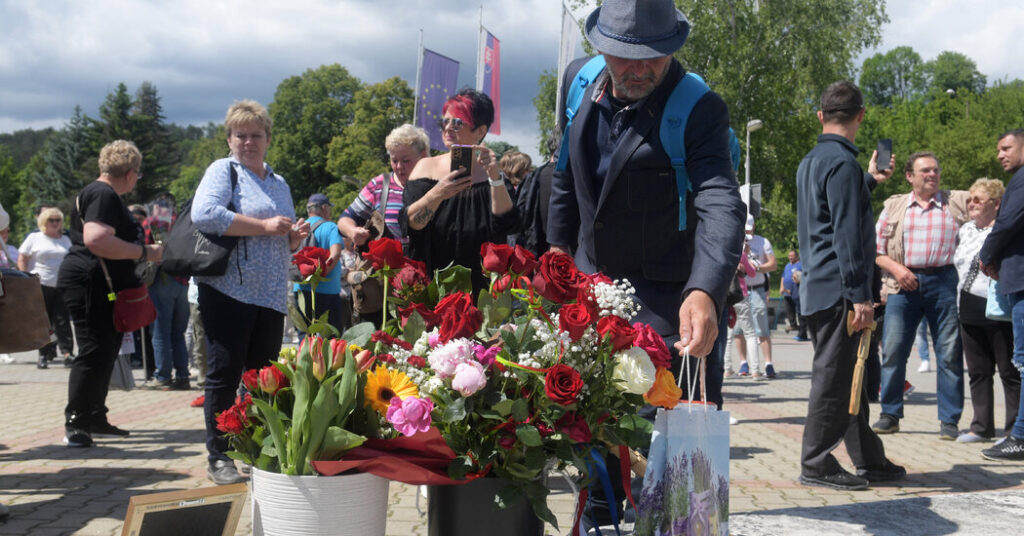More than a week after he was shot in an assassination attempt, Slovakia's prime minister remained in hospital in serious condition on Thursday, with calls for political unity after the attack giving way to renewed hostility in the polarized central European country.
On May 15, Prime Minister Robert Fico was shot multiple times at close range in the central Slovak town of Handlova. The assassination attempt was the most serious attack on a European leader in decades and shocked Europe.
Fizo has undergone several surgeries since the shooting, and the government said Thursday that his condition “remains serious but stable” at a hospital in Banská Bystrica in the city center.
Even before Fico was shot and killed, Slovakia was deeply divided between supporters of his right-wing nationalist and anti-immigration policies and opponents who accuse him of eroding democracy. The shooting prompted Slovak officials to appeal to political parties to urgently de-escalate tensions, with some warning of the risk of civil war.
But attempts to lower temperatures appear to have failed as the country returns to politics as usual.
Much of the hostility centres around a bill the government is pushing through parliament that would give it greater control over public broadcasting.
Critics have accused Fico's government of stoking tensions and antagonizing the media, and his party has called for an overhaul of broadcasters to root out what it sees as unfair bias in favour of political opponents.
The bill is part of a package of measures including restrictions on corruption investigations and what critics denounce as Russian-style restrictions on non-governmental organisations, which the European Commission said in February risked causing “irreparable damage” to the rule of law in Slovakia.
The bill was being debated in the Slovak parliament on the day Fico was shot dead, after the attack led to parliament being adjourned before resuming session this week.
Its first task on Tuesday was to approve a resolution condemning the attack on Mr Fico and calling on political parties and the media to “not spread hatred”.
Parliament took up the broadcaster bill on Wednesday. It passed its first reading with 77 lawmakers voting in favour and 53 against. The bill needs to be approved by at least one more reading and signed by the president before it becomes law.
Opposition Progressive Slovakia leader Michal Simecka welcomed the government's call to “calm things down” by suspending campaigning for next month's European elections, but he criticised Fico's government over the bill, calling it “a bad law that goes against the interests of our people and against European rules”.
He called on the government to withdraw the bill and “end dangerous efforts” to control television and radio in Slovakia.
Slovakia's outgoing president Zuzana Čaputová and her successor, Peter Pellegrini, have vowed to invite leaders of Slovakia's main political parties to a meeting to “calm down the situation.”
“The past few days have shown that some politicians are completely incapable of basic self-reflection, even after such a great tragedy,” Pellegrini said in a lengthy video posted on social media on Sunday, without naming anyone. “They do not seem to understand that their past actions, their words and their sickening attacks, not on political ideas but on their advocates, have contributed greatly to tensions in our societies.”
The meeting was ultimately called off this week “due to public comments made by some of the leaders,” according to local news media.
Interior Minister Matusz Staj Estok has insisted the government is committed to building political peace, but on Thursday he suggested he had no intention of forgetting old grudges.
“We do not want to increase tensions in society. But we will never forget what brought us to this state,” he said in what appeared to be an attack on government critics. he wrote in a Facebook post.
Mr. Fico began his 30-year political career on the left but has long embraced right-wing political views with his party, Smer. Mr. Fico's opponents have criticized some of his plans as an attempt to return Slovakia to the repressive Soviet era.
Fico previously served as prime minister from 2006 to 2010 and from 2012 to 2018, but was ousted amid street protests over the killing of a journalist investigating government corruption. He unexpectedly returned to the premiership last year, making a remarkable resurgence after campaigning on a pro-Russian platform and promising social conservatism, nationalism and generous welfare benefits.
Slovak authorities have released little information about the assassination attempt other than to say it was carried out by a politically disaffected man who became radicalized after the recent presidential election.
The 71-year-old suspect, identified by authorities only as Juraj C., will be charged with attempted premeditated murder. He appeared before a judge for a closed-door hearing in the western Slovak city of Pezinok on Saturday and was remanded in custody. Slovakia's general prosecutor on Thursday declined to say when the suspect would next appear in court.
Cassandra Vinograd Reported from London, Sarah Cinculova From Bratislava, Slovakia


